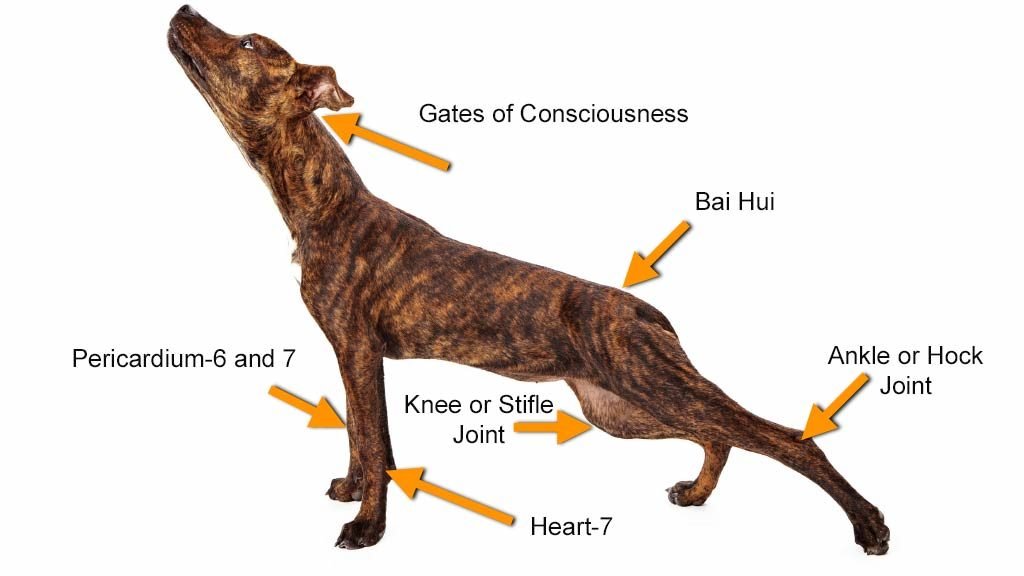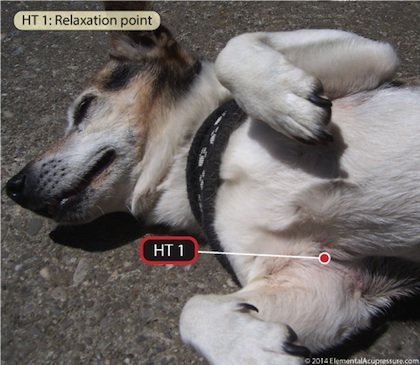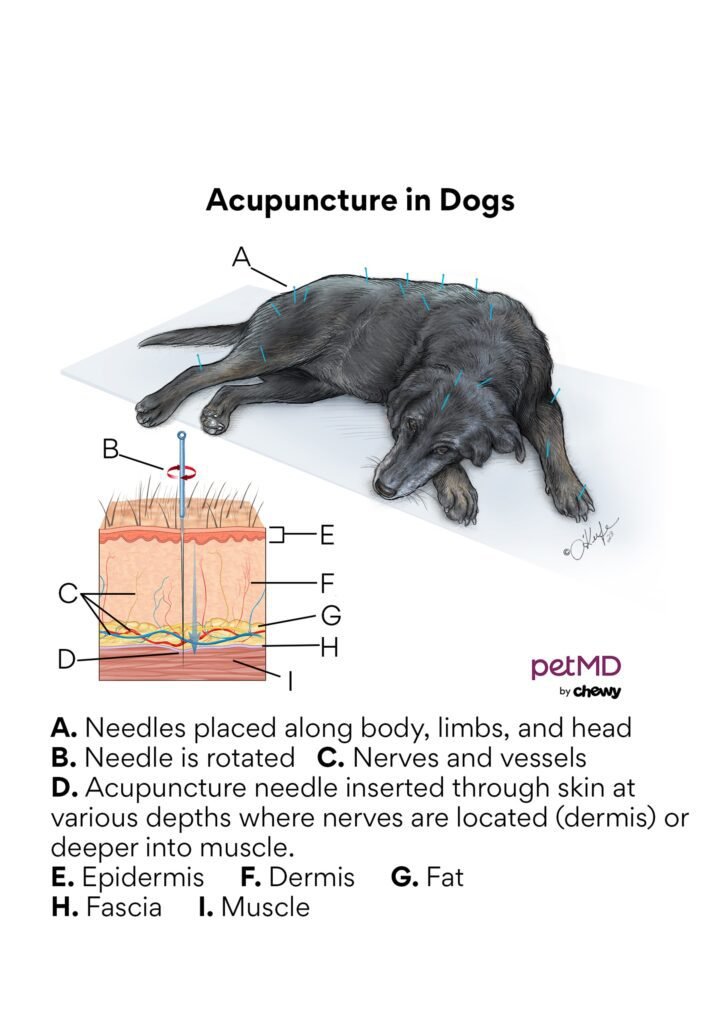If you’ve ever seen your furry friend trembling or pacing nervously during a thunderstorm or fireworks display, you know how distressing anxiety can be for dogs. But did you know that acupuncture and acupressure, alternative therapies commonly used to treat humans, might also hold promise for our canine companions? With their growing popularity in veterinary medicine, many pet owners are turning to these ancient practices in the hopes of finding natural solutions to help ease their furry friends’ anxiety. In this article, we’ll explore whether acupuncture or acupressure can indeed be effective in reducing anxiety in dogs, providing valuable insights for dog owners who are seeking holistic approaches to help their beloved pets find peace and tranquility.
Understanding Anxiety in Dogs
Anxiety in dogs is a common condition that can greatly impact their overall well-being. It’s important for dog owners to be able to recognize the signs and symptoms of anxiety in their furry friends. Some common signs include excessive barking, panting, trembling, pacing, and destructive behavior. Dogs may also exhibit avoidance behaviors or attempt to escape when they are feeling anxious. It’s crucial to understand that anxiety can manifest in different ways for each individual dog, so it’s essential to pay attention to any changes in their behavior and seek professional advice if needed.
Causes of Anxiety in Dogs
There are several potential causes of anxiety in dogs. One common cause is separation anxiety, which occurs when dogs are distressed by being separated from their owners or left alone for extended periods of time. Other triggers can include loud noises (such as thunderstorms or fireworks), changes in routine or environment, traumatic experiences, or even genetic predisposition. It’s important to consider these underlying causes when addressing and managing a dog’s anxiety to ensure the most effective approach.
Impact of Anxiety on Dogs’ Overall Well-being
Untreated anxiety can have a significant negative impact on a dog’s overall well-being. Chronic anxiety can lead to a variety of physical and behavioral issues, including gastrointestinal problems, increased susceptibility to infections, aggression, and even self-injury. Moreover, anxious dogs may experience a reduced quality of life, as their anxiety prevents them from fully enjoying daily activities and experiences. This is why it’s crucial to explore different treatment options to help manage and alleviate anxiety in dogs.
Acupuncture for Anxiety in Dogs
Acupuncture is a therapeutic technique originating from traditional Chinese medicine that involves inserting thin needles into specific points on the body. The goal is to stimulate these points to restore the flow of energy, known as Qi, and promote overall well-being. While acupuncture is commonly used for humans, it has also gained recognition as a potential treatment option for anxiety in dogs.
Explanation of Acupuncture
In acupuncture, the body is believed to contain channels called meridians through which Qi flows. When there is a disruption in this flow, it can lead to imbalances and health problems. The insertion of fine needles at specific acupuncture points is believed to restore the balance of Qi and promote healing.

This image is property of animalmedicalnc.com.
How Acupuncture Works on Dogs
Acupuncture for dogs is thought to work in a similar way to humans. The needles stimulate specific acupuncture points, which are often located near nerve endings. This stimulation is believed to release endorphins, which are natural painkillers and mood enhancers. Additionally, acupuncture is thought to influence the central nervous system, helping to regulate brain chemicals and hormones that play a role in anxiety.
Research on Acupuncture for Canine Anxiety
While research on acupuncture for canine anxiety is still limited, some studies have shown promising results. One study found that acupuncture reduced anxiety-related behaviors in dogs diagnosed with separation anxiety. Another study found that acupuncture combined with behavioral therapy had positive effects on anxiety and fear-related behaviors in dogs. However, more research is needed to further explore these findings and better understand the potential benefits of acupuncture for anxiety in dogs.
Effectiveness of Acupuncture in Reducing Anxiety in Dogs
The effectiveness of acupuncture in reducing anxiety in dogs can vary from case to case. While some dogs may show significant improvements after a few sessions, others may require more frequent or prolonged treatment. It’s important to keep in mind that individual responses to acupuncture can vary, and it may not be a standalone solution for all dogs with anxiety. However, when used in combination with other management techniques, acupuncture can be a valuable tool in reducing anxiety and improving the well-being of dogs.
Potential Benefits and Limitations of Acupuncture
One of the major benefits of acupuncture is that it is a non-invasive and drug-free treatment option, which can be particularly appealing to dog owners who prefer a more holistic approach. Acupuncture also carries a low risk of side effects when performed by a qualified practitioner. However, it’s important to note that not all dogs may respond to acupuncture, and the extent of its effectiveness may vary depending on the individual dog and the underlying causes of their anxiety. It’s recommended to consult with a veterinarian and a qualified acupuncture practitioner to determine whether acupuncture is a suitable option for your dog.
Acupressure for Anxiety in Dogs
Similar to acupuncture, acupressure is a traditional healing technique that involves applying pressure to specific points on the body to promote well-being. Acupressure can be a viable alternative for dog owners who may be hesitant or unable to pursue acupuncture treatment.

This image is property of animalwellnessguide.com.
Explanation of Acupressure
Acupressure is rooted in the same principles as acupuncture, utilizing the body’s energy channels and pressure points. However, instead of using needles, acupressure uses gentle physical pressure, typically applied with the fingertips or the palm of the hand, to stimulate the points of interest. The goal is to promote balance and relieve blockages of energy flow, thereby addressing anxiety and promoting overall wellness.
How Acupressure Works on Dogs
Acupressure for dogs involves applying pressure to specific points along the body, which are thought to correspond to different organs and systems. This pressure is believed to stimulate the body’s self-healing potential and promote relaxation. By gently manipulating these points, acupressure aims to release tension, reduce anxiety, and restore balance to the dog’s energy flow.
Research on Acupressure for Canine Anxiety
Research specifically investigating acupressure for canine anxiety is limited. However, studies have shown that acupressure can have positive effects on stress reduction and behavior modification in dogs. One study found that acupressure sessions led to a decrease in anxious behaviors in shelter dogs. Another study reported improvements in anxiety-related behaviors and overall well-being in dogs receiving acupressure sessions. While more research is needed to support these findings, the preliminary results suggest that acupressure may be a beneficial treatment option for canine anxiety.
Effectiveness of Acupressure in Reducing Anxiety in Dogs
Similar to acupuncture, the effectiveness of acupressure in reducing anxiety in dogs can vary. Some dogs may respond well to acupressure and show noticeable improvements in their anxiety levels, while others may require ongoing or combined treatments to achieve desired results. It’s important to work closely with a qualified practitioner and monitor your dog’s progress to determine the most effective treatment plan.
Comparison of Acupressure and Acupuncture for Anxiety
When considering acupressure and acupuncture as treatment options for anxiety in dogs, it’s essential to consider the individual needs and preferences of your pet. Both techniques aim to restore balance and reduce anxiety, but the main difference lies in the method of stimulation. Acupuncture involves the insertion of fine needles, whereas acupressure utilizes gentle pressure applied with the hands. Some dogs may be more receptive to one technique over the other, so it may be necessary to try both or consult with a professional to determine which approach is best suited for your dog.

This image is property of www.fearfreehappyhomes.com.
Safety Considerations for Acupuncture and Acupressure in Dogs
When considering any alternative therapy for dogs, it’s important to prioritize their safety. While acupuncture and acupressure are generally considered safe when performed by qualified practitioners, it’s crucial to choose a reputable practitioner with proper training and certification. This ensures that the techniques are applied correctly and minimizes the risk of injury or adverse effects.
Potential Risks and Side Effects
While rare, there are potential risks and side effects associated with acupuncture and acupressure in dogs. Minor bruising or bleeding may occur at the needle insertion sites during acupuncture. It’s also possible for dogs to experience temporary discomfort or soreness following a session. It’s important to closely observe your dog after each treatment and report any unusual or concerning symptoms to your veterinarian or practitioner.
Importance of Proper Training and Certification
To ensure the well-being and safety of your dog, it’s essential to choose a practitioner who is properly trained and certified in acupuncture or acupressure. Look for practitioners who have received formal education and have completed extensive training programs. Additionally, certification from recognized organizations or associations can provide further assurance of their expertise. Don’t hesitate to ask for their credentials and qualifications before proceeding with any treatment.
Choosing a Reputable Acupuncture or Acupressure Practitioner
When searching for a qualified acupuncture or acupressure practitioner for your dog, it’s important to do thorough research. Seek recommendations from trusted sources, such as your veterinarian, local animal shelters, or fellow dog owners who have had positive experiences with these therapies. Additionally, reading reviews and testimonials from others who have utilized the services of a particular practitioner can provide valuable insights into their skills and the overall quality of care provided.
Credentials and Qualifications to Look For
When assessing the credentials and qualifications of an acupuncture or acupressure practitioner, look for individuals who have completed a comprehensive training program specific to these practices. They should have a thorough understanding of canine anatomy, physiology, and the principles of traditional Chinese medicine. Additionally, certifications from reputable organizations, such as the International Veterinary Acupuncture Society (IVAS), can serve as an indication of their commitment to maintaining high standards of practice.

This image is property of www.rover-time.com.
Consulting with a Veterinarian
Before pursuing acupuncture or acupressure treatment for your dog’s anxiety, it’s crucial to consult with a veterinarian. A qualified veterinarian can evaluate your dog’s overall health, assess their anxiety levels, and provide guidance on the most appropriate treatment options. They may also be able to recommend reputable practitioners in your area or work in collaboration with a licensed acupuncturist or acupressure practitioner to develop a comprehensive treatment plan tailored to your dog’s specific needs.
Pre-session Preparation for Dogs
To ensure a positive and comfortable experience during acupuncture or acupressure sessions, there are a few steps you can take to prepare your dog. First, introduce your dog to the practitioner and allow them to establish a rapport. This helps to build trust and create a calming environment. Additionally, it’s important to ensure that your dog is well-rested, has had an opportunity to relieve themselves, and has had a light meal prior to the session. These preparations can help your dog feel more relaxed and receptive to the treatment.
Creating a Calm and Comfortable Environment
During acupuncture or acupressure sessions, creating a calm and comfortable environment is crucial. Choose a quiet room with minimal distractions, such as noise from other pets or household activities. Dimming the lights and playing soft, soothing music can help to create a tranquil atmosphere. Additionally, providing your dog with a cozy blanket or bed can enhance their comfort and relaxation during the session.
Addressing Any Existing Health Conditions
Before starting acupuncture or acupressure treatment, it’s important to address any existing health conditions or concerns your dog may have. Inform the practitioner about any medications your dog is taking, as well as any allergies or sensitivities they may have. This allows the practitioner to make informed decisions and adjustments to the treatment to ensure your dog’s safety and well-being.
Potential Sedation or Anesthesia Requirements
In some cases, dogs may require sedation or anesthesia during acupuncture or acupressure sessions. This may be necessary for dogs who are highly fearful, aggressive, or unable to remain still during the treatment. The decision to use sedation or anesthesia should be made in consultation with your veterinarian and the acupuncture or acupressure practitioner, taking into consideration your dog’s specific needs and well-being.

This image is property of image.petmd.com.
Number of Sessions Typically Needed for Results
The number of acupuncture or acupressure sessions needed to achieve noticeable results may vary depending on the individual dog and the severity of their anxiety. While some dogs may experience improvements after just a few sessions, others may require ongoing treatments over an extended period. The practitioner will develop a treatment plan tailored to your dog’s needs, considering factors such as their response to treatment, the underlying causes of their anxiety, and their overall progress.
Duration and Frequency of Sessions
The duration of acupuncture or acupressure sessions can range from 10 to 60 minutes, depending on the specific treatment plan and the needs of the individual dog. Initially, sessions may be more frequent, such as once or twice a week, to establish a therapeutic effect. As your dog progresses and responds to treatment, the frequency may decrease to once every few weeks or once a month. The practitioner will determine the most appropriate schedule based on your dog’s progress and individual requirements.
Monitoring and Assessing the Dog’s Progress
Regular monitoring and assessment of your dog’s progress are essential throughout the acupuncture or acupressure treatment. This allows the practitioner to evaluate the effectiveness of the treatment plan and make any necessary adjustments. Keep an eye out for changes in your dog’s behavior and anxiety levels, and communicate these observations to both your veterinarian and the practitioner. This collaborative approach ensures that your dog receives the most effective treatment and achieves the best possible outcomes.
Expected Changes in Anxiety Levels
The changes in your dog’s anxiety levels following acupuncture or acupressure treatment will vary depending on the individual dog and their specific needs. Some dogs may experience a noticeable reduction in anxiety, while others may show more subtle improvements. It’s important to have realistic expectations and understand that anxiety management is often a multifaceted approach. Alongside acupuncture or acupressure, other techniques such as behavioral therapy, medications or supplements, natural remedies, and exercise may be incorporated to optimize the overall well-being of your dog.
Behavioral Therapy for Anxious Dogs
Behavioral therapy is a crucial component of the comprehensive management of anxiety in dogs. This form of therapy focuses on modifying the dog’s emotional and behavioral responses to anxiety-inducing triggers. Techniques such as desensitization, counterconditioning, and positive reinforcement are employed to help dogs develop more positive associations and coping mechanisms. Behavioral therapy can be used in conjunction with acupuncture or acupressure and other treatment options to address the underlying causes of anxiety and support long-term behavior modification.
Medications and Supplements for Anxiety
In some cases, medications or supplements may be prescribed to manage anxiety in dogs. Anti-anxiety medications, such as selective serotonin reuptake inhibitors (SSRIs) or benzodiazepines, may be recommended for dogs with severe or debilitating anxiety. These medications work by altering brain chemistry to reduce anxiety symptoms. Additionally, supplements such as tryptophan, L-theanine, or herbal remedies like chamomile or valerian root may be used to support relaxation and promote a sense of calm in anxious dogs. It’s important to consult with a veterinarian before administering any medications or supplements to ensure they are safe and appropriate for your dog.
Natural Remedies and Calming Aids
Natural remedies and calming aids can also be used to help reduce anxiety in dogs. These can include aromatherapy, the use of calming pheromone sprays or diffusers, or the implementation of a consistent daily routine. For example, creating a safe haven or den-like space for your dog with comfortable bedding and familiar toys can provide a sense of security. Additionally, providing engaging toys, interactive puzzles, or treat-dispensing devices can help keep dogs mentally stimulated and distracted from anxiety triggers.
Exercise and Mental Stimulation
Regular exercise and mental stimulation are vital aspects of managing anxiety in dogs. Physical activity not only helps release excess energy but also triggers the release of endorphins, which are natural mood enhancers. Daily walks, play sessions, or engaging in canine sports can help reduce stress and promote overall well-being in dogs. Mental stimulation, such as puzzle toys, obedience training, or scent work, can also provide an outlet for mental energy and help distract dogs from anxiety-provoking stimuli.
Considerations for Specific Dog Breeds
Different dog breeds may have varying tendencies towards anxiety. Some breeds may be more prone to anxiety-related behaviors due to genetic factors or breed-specific traits. For example, certain toy breeds, like Chihuahuas or Shih Tzus, may be more prone to separation anxiety. It’s important to consider these breed-specific tendencies when exploring treatment options, including acupuncture or acupressure. While these techniques can be beneficial for dogs of any breed, it may be particularly crucial to address anxiety proactively in breeds known to have a higher predisposition.
Effectiveness of Acupuncture or Acupressure for Different Breeds
The effectiveness of acupuncture or acupressure in reducing anxiety can vary among different dog breeds. Some breeds may respond more favorably to these techniques, while others may require additional or alternative approaches to achieve the desired results. It’s important to work closely with a qualified practitioner and monitor your dog’s progress to determine the most effective treatment plan for their specific breed and anxiety needs.
Additional Considerations for Certain Breeds
Specific dog breeds may have additional considerations when exploring acupuncture or acupressure treatment for anxiety. For example, brachycephalic breeds, such as Bulldogs or Pugs, may have respiratory challenges that need to be taken into account during treatment. Similarly, large breeds with musculoskeletal issues, like Great Danes or Saint Bernards, may require special care or adaptations during acupuncture sessions. It’s crucial to communicate any breed-specific concerns to the practitioner to ensure the well-being and safety of your dog throughout the treatment process.
Conclusion
In conclusion, both acupuncture and acupressure offer potential benefits in reducing anxiety in dogs. While more research is needed to fully understand their effectiveness and the specific mechanisms behind their action, studies have shown promising results. These techniques can serve as valuable tools when used alongside behavioral therapy, medications or supplements, natural remedies, and exercise. It’s important to consult with a qualified practitioner and work in collaboration with your veterinarian to develop a comprehensive treatment plan tailored to your dog’s individual needs.
